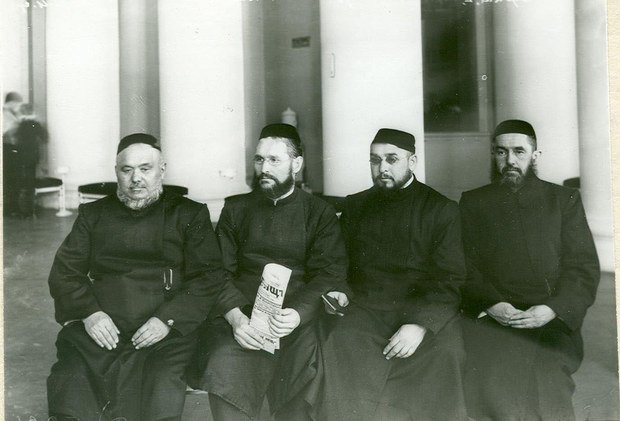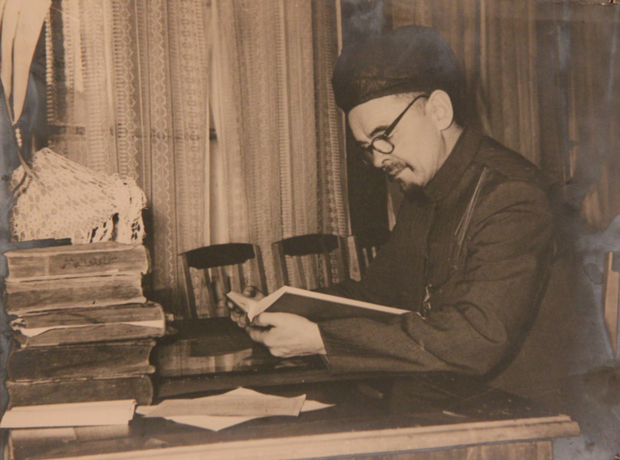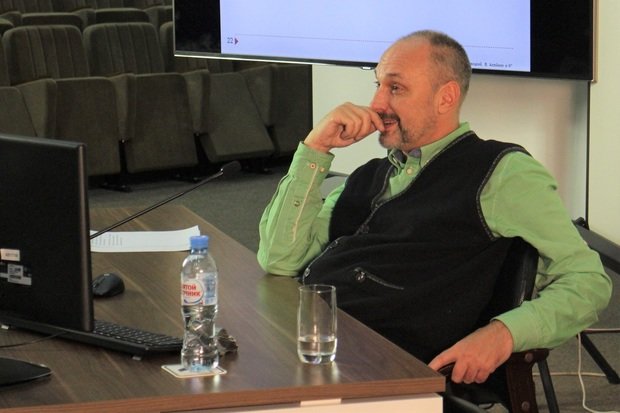Russian Islam: from the language of polemics with Orthodox Christians and atheists to state projects
Reflections on the topic ''Does Russian Islam have future?'' following Putin's visit to Tatarstan
President of Russia Vladimir Putin has recently visited Ufa and Kazan. In the capitals of Tatarstan and Bashkortostan, the president met with the muftis, in the conversation with whom he expressed support for traditional Islam ''with its own face.'' In this regard, columnist for Realnoe Vremya Alfrid Bustanov in today's newspaper column, written for our online newspaper, reflects on the topic of Russian Islam and its future.
Does Russian Islam have future? This question may seem strange. As the visit of the Russian president to Kazan has shown, there are no reasons for concern for the fate of Islam in Russia. However, let me explain what I mean. Under Russian Islam in this text I understand the recent phenomenon of Russian-speaking Islamic culture in our country, the result of the fusion of national Islamic cultures and Russian/Soviet civilization. What is the background of this phenomenon and does it have a future?
Islam as part of Russian culture
In modern Russia we observe the interesting phenomenon of close intertwining of Russian (basically Christian) and Islamic cultures. The president tells about this, ''Without doubt, traditional Islam is an important part of the Russian cultural pattern.'' I have repeatedly expressed a similar idea at my lectures: Islam today has truly become part of Russian culture.
This intertwining is not simply a result of Imperial diversity, multifarious catalogue of peoples, languages and faiths of our country, but also an intermediate result of the long process of merger of Russian culture with Islam, and vice versa.
In Imperial Russia, the boundaries of the confessions were clearly defined. A replenishment of the Orthodox Church was welcomed, and the rest were given the right to live in their own ''apartments'', but ''not to confuse'' Orthodox Christians, not to engage in proselytism.
However, in the second half of the nineteenth century, the Christian missionaries were the first to break the status quo: in their polemical writings, they studied the Islamic faith and pointed to its ''shortcomings'' compared to Orthodoxy.
Islamic scholars did not leave a favour unanswered. One of the authors of the response multi-page treatises criticizing Christianity even declared that the writing and distribution of antimissionary works was the main aim for Islamic theologians of Russia. The emotions in these texts ran high: both sides claimed that the truth was only on their side and were unwilling to compromise because it was about the salvation of souls and true doctrine. Many professional theologians were seen in this serious struggle. It was Khasan-Gata Gabashi, and (later) State Duma Deputy Khabibrakhman Masagutov, as well as the father of journalist Fatikh Karimi – Gyylman akhund. Especially wide resonance had the polemical works by Efimy Malov and other missionaries.

Lenin and Pushkin in the struggle for Tawhid
Already in the early Soviet times, the Muslims had to deal with not Christians but atheists. If with the first it was possible to find a common language due to the long history of theological disputes of the Christians, Muslims and Jews in the Middle East, but to build a defense from atheism it needed a new methodology. In 1924, Dagestani scholar Ali Kayaev wrote a work against the materialists using the arguments of philosophers-idealists, absolutely without reference to the Quran and the hadiths. By the heyday of the Brezhnev era, the polemicists armed with a serious armoury of arguments. In fact, the recently discovered by us voluminous treatise by Fatkhelkadyyr Babich with criticism of atheism is a fine example of modern response to ''godless''. Babich in his book in detail tells about that Islam does not contradict science, the ideals of progress and modern discoveries in space and, most importantly, the very foundations of the Communist society. Along with the traditional commentary to the Quran and the hadiths, ethical poetry in Tatar and Persian, Babich quotes Leo Tolstoy and even Alexander Pushkin in a positive way, and also analyzes the theory of relativity and the works of Lenin.
The thing is, despite the fierce disputes of Muslim authors first with Orthodox theologians and then with atheistic propaganda, between these camps there gradually (over a century at least!) forms the common ideological platform. On this platform there was defined a range of common topics for dispute, as well as adopted language of discussion. It turned out that the opponents perfectly understand each other, read the same texts and, in general, are mirror images of each other.
It just so happened that since the administrative resource was in the hands of ideological opponents, the debate and its rules were set first by missionaries, then by atheistic societies.
It turns out that, in a sense, the very formation of this common ideological platform was an (unwitting?) result of the state policy. In the end, Babich, a communist by beliefs and Islamic scholar by training, fought against atheism.
Russian Muslim
Perestroika and post-Soviet situation brought with it a new agenda for the Muslims. The main challenge became the internationalization of Muslims within the Russian language and culture along with the catastrophic crisis of national languages and literatures. The borders began to disappear even faster. In the mosque, one could easily see people of Russian culture, sincere adherents of Islam, as well as representatives of the peoples of Russia having very little idea about their native language and categories of Islamic culture, for centuries developing in the classical literature.
The circle of those who insisted on religious identity, but by language, culture and mentality was simply a Russian, regardless of origin, was expanding.
Danis Garayev in his study shows how the ideas of jihad and radical Islam in post-Soviet Russia rose from the depths of Russian culture, were nurtured not by classical texts from the Middle East, but by the works of Herzen, Aitmatov and even Lev Gumilyov. This is a very important observation, demonstrating mutual civilizational movement: Islam becomes closer to Russian culture, and the Russian culture absorbs Islam.

Is there an image of future Islam?
In my opinion, this phenomenon needs serious historiosophical understanding. From what I can tell, consciously or unconsciously, but the state policy in the field of Islam consists in support of the development of particularly Russian Islam. But in this case, it is important to remember that this strategy can foster not only loyal ''traditional Islam'', but also (hybrid) radical views, against which it is useless to fight with an eye on the brochures about the Wahhabis because the radicals do not read them. At the time, some Islamic leaders even sounded the alarm, directly linking religious radicalism with linguistic russification.
Another truth is that national and theological traditions also went on rapprochement with the Russian/Soviet culture as we see it in the legacy of Fatkhelkadyyr Babich, Gabdelbari Isaev and many other theologians of the Soviet era. But in these texts it was preserved the diversity of key categories of Islamic culture that developed in Russia: perceptions of personal qualities of a Muslim, balanced status of the Muslims among the believers of other faiths, the attitude to the state, and more. However, if the pace of dashing cavalry attack on the national education in our country does not decrease, all this — the living heritage of Islamic culture in Russia — finally and irrevocably will become merely museum artifact. And since no one has the real desire and will (not beautiful declarations) to develop this important area, then this pessimistic (for national cultures, of course) scenario, alas, turns out to be the most likely. What, in turn, opens the way for further speculation about the backwardness of Islamic cultures in our country.
Let's say that Russian Islam in a couple of decades (or even years?) will become absolutely dominant form of existence of Islam in our country (and partly abroad, bearing in mind the impact in Kazakhstan and Ukraine). What can we expect from this outcome?
The first expected result is the normalization of Islam. At some point, the horror stories about the terrorists begin to sicken, and the russification of Islam will do the trick. Hijabs, mosques and Friday prayers will inevitably become (or have already become) commonplace of modern urban life. To be a Russian Muslim will also become a matter of the ordinary.
The other result requires great attention. The thing is that in the same way as in European languages, in Russian there is no major cultural traditions of Islamic theology and the diversity of Islamic art and everyday practices. Until the beginning of the 20th century, the Muslims of Russia almost did not write in Russian. Now Russian Islamic language is one way of another formed spontaneously simply because people with no knowledge of ''Islamic'' languages need to speak on religious and pseudo-religious topics. In a couple of decades the Muslims themselves chose how to call a particular phenomenon in ''Islamic''.
But the thing is that it is impossible to build Russian Islam on this shaky foundation. How to ''adapt'' the Russian language, in which many key categories have Christian semantics, to the needs of Islamic culture? What out of the rich heritage of national theological traditions can we bring in a brighter future? How to make so that Russian Islamic space was a system, not just random words and meanings?

The categories of Russian Islam
It seems to me that here, in addition to spontaneous ''people's'' creativity, we can not do without serious consideration of the Russian Islamic project by the Muslims themselves. Some attempts have already been made, but mostly in relation to Russian people as the nation, but not Russian-speaking Muslims in general (with the exception of the much talked-of project Russian Islam by Peter Schedrovitsky and Sergey Gradirovsky, where it was supposed to create own theological school in the Russian language, which today is being implemented).
The system project of Russian Islam presupposes some institutionalization. Perhaps, eventually over some time there will appear platforms that will strategically discuss the content and philosophy of Russian Islam. It is not necessarily these platforms should take the form of costly institutions. It can be horizontal virtual communities, honed under the corresponding programme. Important here is the principle of horizontal connections as state concepts and ''manifestos'' written with an eye on the current political situation are often not worth the paper on which they are printed.
But the most important thing is not institutions but ideas. It is a difficult thing yet. The trouble is that many talented and ''Islamically'' well-educated people are more busy with chores in the muftiates (at best), not with creation of deep philosophical treatises. Therefore, the images of the future are in the hands of the Muslims themselves.
Reference
Alfrid Bustanov
Ph.D. (Amsterdam University, 2013)
Professor at History Department of the European University in St. Petersburg.
The author of the books Soviet Orientalism and the Creation of Central Asian Nations (London — New York, 2015) and Book Culture of Siberian Muslims (Moscow, 2012). A columnist for Realnoe Vremya